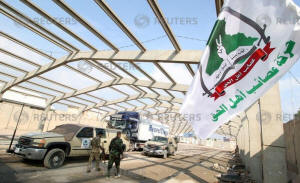|
In Iraq’s parliament, Shi’ite militia
leaders plan to call the shots
 Send a link to a friend
Send a link to a friend
 [November 13, 2018]
By Ahmed Rasheed, Babak Dehghanpisheh and Michael Georgy [November 13, 2018]
By Ahmed Rasheed, Babak Dehghanpisheh and Michael Georgy
BAGHDAD (Reuters) - In May, Hassan Fada'am
traded his military fatigues for a suit when he became one of 45 Shi'ite
militiamen elected to Iraq's 329-seat parliament.
Fada'am trained as a soldier in Iran and fought against Islamic State in
Iraq. Now he's a politician as paramilitary groups backed by Iran have
doubled their number of seats in Iraq's parliament. The Fatih Alliance
bloc that represents them has become the second largest political bloc.
In interviews, eight militiamen who have translated their battlefield
success into electoral victories set out how they plan to use this new
platform. Six months after the vote, Iraq's new Prime Minister Adel
Abdul Mahdi has yet to win parliamentary approval for his government.
Yet already one thing is evident, the militia are better placed than
ever to influence policies, from domestic security to foreign policy.

Mahdi's predecessor as prime minister, Haider al-Abadi, has said he
fears the militiamen will undermine efforts to unify Iraq. Its young
democracy is trying to balance the demands of its Sunnis, Kurds and
Shi'ites after years of sectarian conflict, and the economy is only
beginning to recover from the country's war with Islamic State. Abadi
tried, unsuccessfully, to prevent militia leaders from standing in the
2018 election.
"How can a military outfit have a political opinion? This does not
happen in any part of the world. It is prohibited," he said at the time.
The militiamen responded by announcing they would quit their military
roles to comply with Iraq's electoral code.
Some in Washington are also worried. Republican senators have introduced
a bill that would impose sanctions on two Iranian-backed militias in
Iraq, Asaib Ahl al-Haq and Harakat Hezbollah al Nujaba. Sponsors of the
Iranian Proxies Terrorist Sanctions Act include Senators David Perdue,
Ted Cruz and Marco Rubio.
Iran is unperturbed. "In the meetings we had with our Iraqi brothers,
they assured us that Iraq could not be used by America," said a former
Iranian ambassador in the region, now a senior official in Tehran.
Among Iran's Iraqi allies is the Badr Organization, which won 21 seats
at the election. For two decades, Badr's leader Hadi al-Amiri led the
fight against Saddam Hussein from exile in Iran. A Badr local commander,
Karim Nouri, said communication with Iran was ongoing "to keep Tehran's
rivals – the United States and Saudi Arabia – in check." He did not
elaborate.
Hisham Hashemi, a security adviser to Iraq's government, said he
believed that Iran was in touch with Shi'ite politicians "in order to
have a means of applying political pressure, to guarantee their loyalty,
to make sure they have an armed force loyal to them. They provide advice
on PR, propaganda, marketing, media, speeches, social media."
INSPIRED BY IRAN, SUSPICIOUS OF AMERICA
When Iraq's top Shi'ite cleric Grand Ayatollah Ali al-Sistani urged his
fellow Shi'ites to join the fight against Islamic State in 2014, Fada'am
was among the tens of thousands of Shi'ites who answered the call. He
led the Dawn Brigades, a force of 3,400 fighters.

After driving Islamic State from the town of Jurf al-Sakhr south of
Baghdad, Fada'am lobbied the local government in his province of Hilla
to cancel the property rights of Sunnis in the area, saying they were
tied to Islamic State. The Hilla provincial council agreed to his
request.
Elected in May to represent Hilla in parliament, Fada'am says he now
devotes his time to politics, frequently appearing on talk shows
broadcast on Shi'ite television channels to drive home his
anti-corruption message. Visitors stream into his office in Hilla
seeking help. Like many parts of Iraq, Hilla lacks basic services. Roads
are potholed. Medical facilities are crumbling. He receives hundreds of
requests from young people wanting a job in the civil service.
Across town from his office is a hospital run by his followers. It
provides free medical care for militia fighters and members of the
public. Patients have access to an orderly, well stocked pharmacy. The
rooms are cleaner than most medical facilities in Iraq.
"At the end of the day we must switch to politics to rebuild our
country. Rebuilding the country and maintaining its security could come
only through good politics," said Fada'am.
Another militiaman turned politician, Falih Khazali, fought on the side
of President Bashar al-Assad in Syria's civil war and lost an eye
defending a Shi'ite shrine near Damascus. These days, he operates from
Iraq's second city Basra in the oil-producing south. Posters of Iranian
Supreme Leader Ayatollah Ali Khamenei and revolutionary leader Ayatollah
Ruhollah Khomeini adorn the wall of his office. He is beginning his
second term in parliament, having been elected for the first time in
2014.
[to top of second column]
|

Members of Shi'ite group Asaib ahl al-Haq walk outside their
premises in Basra, Iraq November 8, 2018. The text on the flag
reads: 'Asaib ahl al-Haq Movement'. Picture taken November 8, 2018.
REUTERS/Essam al-Sudani

"The Americans should not consider Iraq as one of their villages.
Iraq is an independent state with an ancient history. The United
states must not deal with Iraq on the basis of zero give and 100
percent take," he said.
"Iran's role was very effective in arming Iraqi forces and the
Hashid (militia) through the government. Only the Islamic Republic
of Iran supported Iraq when the state was about to collapse. All
others were onlookers."
Like Iran, Khazali is opposed to the American military presence in
Iraq. He says he is "pushing for a draft law to force government to
reconsider bilateral military cooperation with the United States."
About 5,200 U.S. troops are based in Iraq. They will stay "as long
as needed" to help stabilize regions previously controlled by
Islamic State, said a spokesman for the U.S.-led international
coalition.
UNCLEAN WATER, CORRUPT OFFICIALS
Like Fada'am, Khazali is focused on everyday issues that are
important to Iraqis: contaminated water, dilapidated infrastructure
and corrupt officials. He has opened his office in Basra to anyone
who can provide proof of official corruption. He says he has put
together a file containing 100 cases. During the first session of
parliament in mid-September, Khazali successfully urged the chamber
to send a delegation to investigate the "miserable conditions" in
Basra, the scene of protests over unsafe water, power shortages,
unemployment and corruption.
"Fighting corruption is my primary target now after defeating
Islamic State," he said. "Corruption is a second Islamic State if
not worse."

That's a view shared by others, including Asaib ahl al-Haq, one of
the militias that is faced with possible U.S. sanctions. Asaib
militiaman Saad al Husseini, from the town of Kut on the banks of
the Tigris river, has taken up a seat in parliament. He handled
logistics for Asaib during the war against Islamic State, ensuring
fighters showed up at their positions and arranging matters after
deaths. He says the protests in Basra flow from the failings of
successive governments.
"The protests now are a stark evidence that corruption is spreading
in all government institutions. The next step should be fighting
corruption," he said. "My primary objective after becoming a
lawmaker will be helping to legislate to serve people's interests
and monitoring the performance of the government in order to stamp
out corruption."
REVOLUTIONARY GUARD II
Some Iraqi politicians and military officers worry that through the
Shi'ite militias Tehran is trying to create an Iraqi version of the
Iranian Revolutionary Guard, with its parallel security apparatus
and vast business empire. Iraqi militias have shares in
construction, trade and car import companies.
At the Safra border crossing, 90 km north of Baghdad, the Badr
Organisation, Iran's closest paramilitary partner in Iraq, collects
custom tariffs and taxes on goods transported from the Kurdish
region in the north, according to a local councillor and two former
senior Iraqi officials. The councillor said at least $12 to $15
million goes to the Badr group each month.
Local Badr commander, Imad Jafaar, denied the group was using the
crossing to generate funds.
Hard currency exchanges along central Baghdad's busy streets pay
fees to militias to protect keep their businesses, said three owners
of currency exchange businesses and police sources.

Cash flows do not stop at business interests. The Iraqi state budget
allocated $1 billion for the militias during the war with Islamic
State. A Hashid fighter is normally paid $600 a month, compared to
any army soldier's $200 salary.
(Additional reporting by Parisa Hafezi in Dubai; Reporting by Ahmed
Rasheed, Babak Dehghanpisheh and Michael Georgy; editing by Janet
McBride)
[© 2018 Thomson Reuters. All rights
reserved.]
Copyright 2018 Reuters. All rights reserved. This material may not be published,
broadcast, rewritten or redistributed.
Thompson Reuters is solely responsible for this content. |